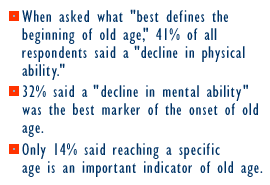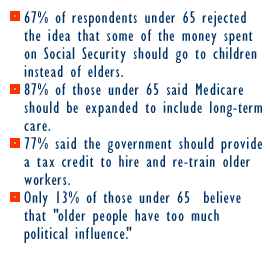|
Survey: Aging is good
|
 |
April 13, 2000: 8:11 a.m. ET
Analysis shows Americans upbeat on growing older, hoping to live to their 90s
By Staff Writer Parija Bhatnagar
|
NEW YORK (CNNfn) - Americans are feeling pretty good about themselves these days. And that's making them greedy -- greedy for life, or a longer one, that is.
The mood is upbeat in the senior camp as older Americans are discovering a renewed sense of satisfaction and security about their future. This "golden age" euphoria is spanning across the generation divide to include the baby boomers as well.
According to a nationwide study by the National Council on the Aging (NCOA), 44 percent of Americans age 65 and older say they're having the time of their lives, while 84 percent of all Americans say they would be happy if they lived to be 90.
"This study has demolished the misconception about old age," said James Firman, president and CEO of NCOA. "The possibility of experiencing positive, vital aging lasting into our tenth decade of life is one of the new realities of the 21st century."
The traditional milestones that marked the end of one phase of life and the beginning of another are being radically redefined, said Firman. To most Americans today, chronological age is becoming less important in determining the right time to retire than a number of other factors such as accumulated savings, health, or mandatory retirement policies.
 About 46 percent of people surveyed age 65 or older said they were not retired, or were retired but were still working, while 38 percent between the ages 55 to 64 said they were retired. About 46 percent of people surveyed age 65 or older said they were not retired, or were retired but were still working, while 38 percent between the ages 55 to 64 said they were retired.
"It's more a stage than an age," said Firman. "The concept of retirement at age 65 is going out the window. Many people are opting to stop working earlier than later. 65 is an irrelevant limit now."
Older people also worry less about crime, finances, and their health, compared to 25 years ago. In 1974, when NCOA last studied the issue, 23 percent of seniors age 65 and older said fear of crime was a "very serious problem". Today, that figure is down to 9 percent. Twenty-one percent cited poor health as a very serious issue in 1974, compared to 12 percent today.
While this reinforced joie de vivre and healthy optimism is a good thing, there is a caveat, Firman said: "We need to remember there are millions of Americans for whom old age is a time of hardship."
Eight-four percent of respondents anticipate groundbreaking medical advances will prolong their lives, but 57 percent are worried that they won't be able to afford them.
"Americans have historically thought about health care and retirement as separate issues, but they are now converging," said Bridget A. Macaskill, chief executive of Oppenheimer Funds, one of the sponsors of the study. "Whether you're paying for a hip replacement, a grandson's education or a Mediterranean cruise, at 70 it all comes out of the same pocket. In the coming years, the nexus between health and money will grow even clearer."
As a robust market continues to generate wealth for Americans, the perception of financial hardship among the elderly is perhaps greater than the reality, said Dr. Robert Butler, chief executive of the International Longevity Center.
"Clearly the robust investment returns and benign inflation of the '90s have improved the finances of many older Americans. While ideas about aging are improving, Americans still need to do a better job preparing for old age," Butler said.
 That means rethinking and reinventing the retirement planning. "The longer one lives, the more dollars one will need to have saved," Macaskill said. "From a planning perspective, you need to prepare for the best -- not the worst. Americans need to manage through retirement -- not to retirement." That means rethinking and reinventing the retirement planning. "The longer one lives, the more dollars one will need to have saved," Macaskill said. "From a planning perspective, you need to prepare for the best -- not the worst. Americans need to manage through retirement -- not to retirement."
Macaskill said people these days are getting more creative when it comes to retirement planning, taking into account factors such as sick parents. About 80 percent of people surveyed said they would sacrifice their own financial security to help their parents.
Still, the study found that people need to learn a lot more about retirement planning. Only 37 percent of respondents said they ever discussed their retirement planning needs with a financial adviser.
"The bull market of the last 20 years means Americans are increasingly being asked to make big decisions about big sums of money," Macaskill said. "It pays to get professional advice, which can make a critical difference in how and when one retires. Relying on genes and luck is just an excuse for inaction."
Lastly, the survey showed that old people are finally getting some respect. About 92 percent of people rejected the idea that "old people are geysers," said Neal Cutler, director of survey research at NCOA.
And old people are even a little bit sexy, the survey found. You can't really give sex appeal a cut-off point, being the message.
"The bottom line is that there is a changing status of age and attitudes toward it," Cutler said. 
|
|
|
|
|
 |

|

